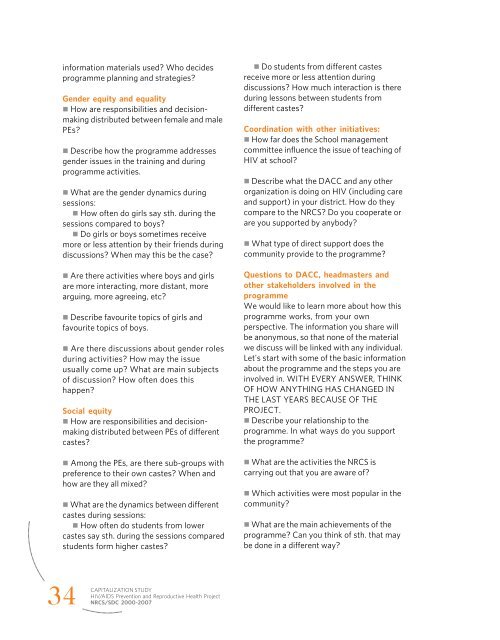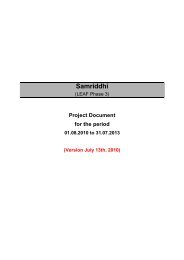HIV/AIDS Prevention & Reproductive Health Project
HIV/AIDS Prevention & Reproductive Health Project
HIV/AIDS Prevention & Reproductive Health Project
You also want an ePaper? Increase the reach of your titles
YUMPU automatically turns print PDFs into web optimized ePapers that Google loves.
information materials used? Who decides<br />
programme planning and strategies?<br />
Gender equity and equality<br />
• How are responsibilities and decisionmaking<br />
distributed between female and male<br />
PEs?<br />
• Describe how the programme addresses<br />
gender issues in the training and during<br />
programme activities.<br />
• What are the gender dynamics during<br />
sessions:<br />
• How often do girls say sth. during the<br />
sessions compared to boys?<br />
• Do girls or boys sometimes receive<br />
more or less attention by their friends during<br />
discussions? When may this be the case?<br />
• Are there activities where boys and girls<br />
are more interacting, more distant, more<br />
arguing, more agreeing, etc?<br />
• Describe favourite topics of girls and<br />
favourite topics of boys.<br />
• Are there discussions about gender roles<br />
during activities? How may the issue<br />
usually come up? What are main subjects<br />
of discussion? How often does this<br />
happen?<br />
Social equity<br />
• How are responsibilities and decisionmaking<br />
distributed between PEs of different<br />
castes?<br />
• Among the PEs, are there sub-groups with<br />
preference to their own castes? When and<br />
how are they all mixed?<br />
• What are the dynamics between different<br />
castes during sessions:<br />
• How often do students from lower<br />
castes say sth. during the sessions compared<br />
students form higher castes?<br />
• Do students from different castes<br />
receive more or less attention during<br />
discussions? How much interaction is there<br />
during lessons between students from<br />
different castes?<br />
Coordination with other initiatives:<br />
• How far does the School management<br />
committee influence the issue of teaching of<br />
<strong>HIV</strong> at school?<br />
• Describe what the DACC and any other<br />
organization is doing on <strong>HIV</strong> (including care<br />
and support) in your district. How do they<br />
compare to the NRCS? Do you cooperate or<br />
are you supported by anybody?<br />
• What type of direct support does the<br />
community provide to the programme?<br />
Questions to DACC, headmasters and<br />
other stakeholders involved in the<br />
programme<br />
We would like to learn more about how this<br />
programme works, from your own<br />
perspective. The information you share will<br />
be anonymous, so that none of the material<br />
we discuss will be linked with any individual.<br />
Let's start with some of the basic information<br />
about the programme and the steps you are<br />
involved in. WITH EVERY ANSWER, THINK<br />
OF HOW ANYTHING HAS CHANGED IN<br />
THE LAST YEARS BECAUSE OF THE<br />
PROJECT.<br />
• Describe your relationship to the<br />
programme. In what ways do you support<br />
the programme?<br />
• What are the activities the NRCS is<br />
carrying out that you are aware of?<br />
• Which activities were most popular in the<br />
community?<br />
• What are the main achievements of the<br />
programme? Can you think of sth. that may<br />
be done in a different way?<br />
34<br />
CAPITALIZATION STUDY<br />
<strong>HIV</strong>/<strong>AIDS</strong> <strong>Prevention</strong> and <strong>Reproductive</strong> <strong>Health</strong> <strong>Project</strong><br />
NRCS/SDC 2000-2007

















